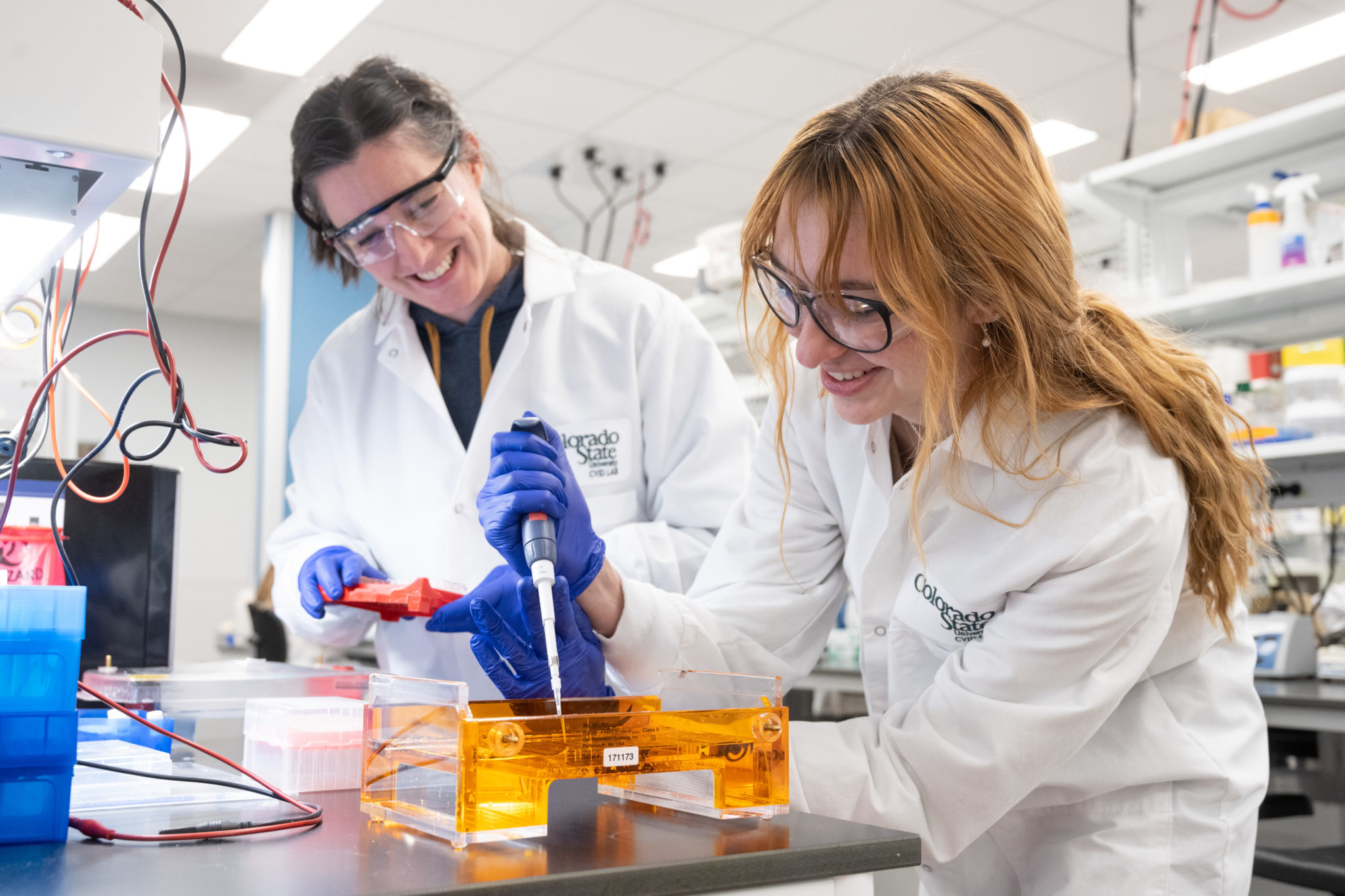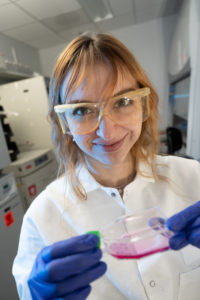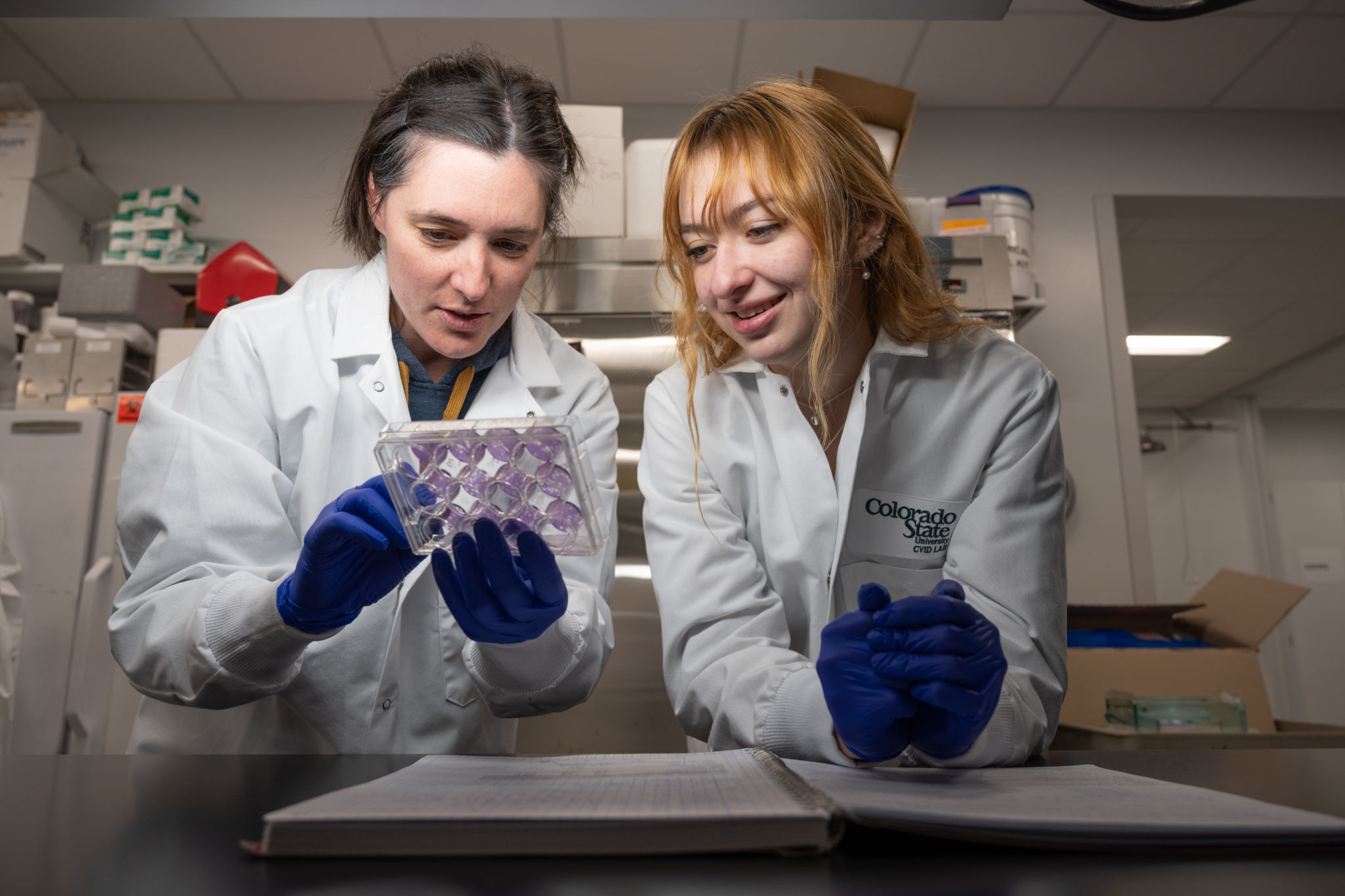
Olivia Martinez has become very good at taking care of mosquitoes. The biomedical sciences sophomore, one of four students in CSU’s first ever cohort of the Maximizing Access to Research Careers (MARC) program, is digging into her first experiment as part of the research team in Rebekah Kading’s lab, an associate professor in the Department of Microbiology, Immunology, and Pathology.
Martinez is helping the team look at the way temperature regulation affects how mosquitoes breed and lay eggs. This will help Kading’s lab, which studies the ecology and transmission dynamics of vector-borne pathogens, better understand how viruses transmit between mother and baby mosquitoes under different temperature conditions. The first task Martinez had to learn was the daily upkeep of the mosquitoes in the insectary.
Growing up in Aurora, Colorado, Martinez always dreamed of becoming a doctor. Throughout high school and college, she found herself becoming increasingly fascinated by the scientific process. She hopes to attend graduate or medical school and is considering pursuing an MD-PhD.
“Right now I am primarily interested in studying infectious diseases, particularly viruses,” says Martinez. “But I am exploring different options.”
Giving students a competitive edge

“Getting into research early is very important,” says Vanessa Selwyn, the College of Veterinary Medicine and Biomedical Sciences graduate training grant program coordinator, who was a MARC scholar herself at New Mexico State University before coming to CSU to get her PhD in cell and molecular biology. “In CSU’s new MARC scholar program, the students come in as sophomores which gives them more time to become competitive for graduate school—and they’ll leave the program being able to complete and present research, and with a great foundation of real-world experiences.”
By identifying and supporting promising underrepresented undergraduate biomedical sciences students, the MARC scholar training program, funded by the National Institutes of Health, aims to increase diversity in the biomedical research workforce. At CSU, it will provide a full scholarship to 20 biomedical sciences undergraduate students for three years of their degree program during its first five-year cycle. After that, CSU intends to continue to renew and grow the program to accommodate more students.
In addition to providing tuition and a stipend, scholars are provided with additional funds for research and travel support, as well as funding for one summer internship at any U.S. institution.
“The National Institutes of Health recognized that we need a diverse group of biomedical researchers in order to answer key questions related to human health, and to ensure that solutions and interventions are successfully translated to a diverse population,” says Dr. Gregg Dean, a professor in the Department of Microbiology, Immunology, and Pathology and the program director of CSU’s MARC program.
“It is giving us a very unique opportunity to really invest in these scholars as well as to positively engage with a network of other universities that also have these grants.”
Another important goal of the program is to cultivate career-long professional development as the students move on to graduate programs and biomedical research careers. Each student is provided with a robust support group made up of faculty, staff, and other student mentors standing behind them.
“We are all here for their support,” Dean says. “We want to be sure that we are best serving their individual needs.” This extends beyond research training and includes networking skills, tips in science etiquette, and getting students comfortable with approaching and talking to different professors.
As part of the grant, CSU is required to track the students’ educational and professional progress for 15 years. “This will help us better understand how these students develop their networks, and how they come to see themselves as scientists and researchers,” Dean says. “We want to know what forms of support are most important and most effective at helping them succeed at all stages of their careers.”
Empowered to take charge of their futures
After several weeks of rotating through different labs that she was most interested in, Martinez opted to spend her time in the MARC program in Kading’s lab. Kading will now serve as Martinez’s primary research mentor for the next three years. Emma Harris, a research scientist in the Kading lab, is currently serving as Martinez’s day-to-day mentor and will also play an integral role in her mentorship over the next few years.

“Our first cohort of scholars are doing very different things, and that’s the beauty of the MARC program,” says Selwyn. “It is very interdisciplinary and the students are not limited. Coming in with all of this funding and support, they are able to choose their lab and research experiences—this really empowers them and allows them to have a strong voice in their scientific career.”
Martinez found the matchmaking process of shadowing others in different labs and learning new skills to be invaluable. “It was so hard to choose, I really loved all the labs I rotated through,” she said. “To have the support of this program and a team of professors to help find a research placement for me that directly lined up with my interests was absolutely fantastic—it has allowed me to get my foot in the door.”
Martinez is already preparing for graduate school and building up her resume as best she can. “I am getting adjusted to balancing a full course load with being in a lab—it can be a bit tricky,” she says. In her free time, she loves tending to her houseplants, reading historical fiction, and hanging out with her cat Slim Jim.
“I also love the mentorship concept of the MARC program and think it is so important,” says Martinez. “I am looking forward to helping mentor next year’s cohort of students and being able to point them in the right direction and share my experience with them.”
The 2023 MARC Scholar application is open and closes March 22. Interviews will take place the week of April 3 with final decisions made by May 30 and the next cohort of students beginning the program in August.
Other pathways currently available for undergraduate students to get involved with research include the College of Veterinary Medicine and Biomedical Science’s annual Research Day, course-based undergraduate research experiences, the Multicultural Undergraduate Research Art and Leadership Symposium, and the Research Experiences for Undergraduates program.